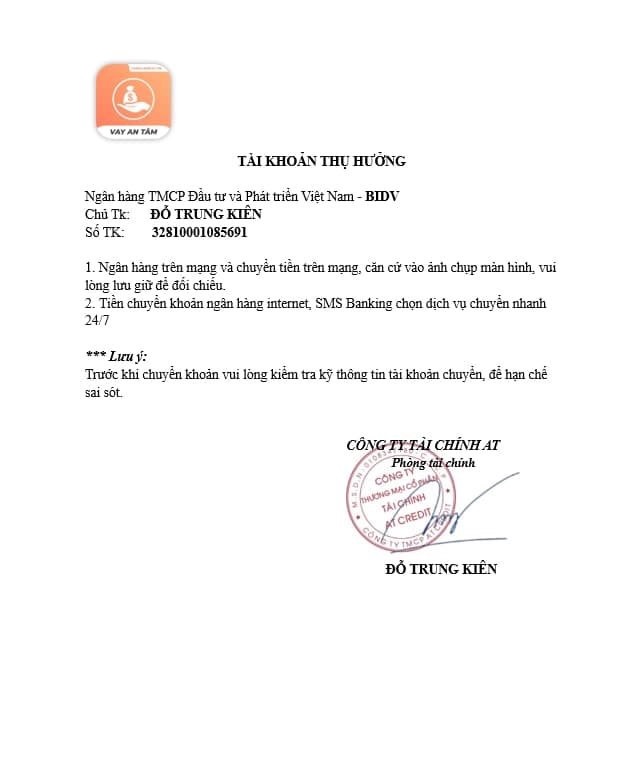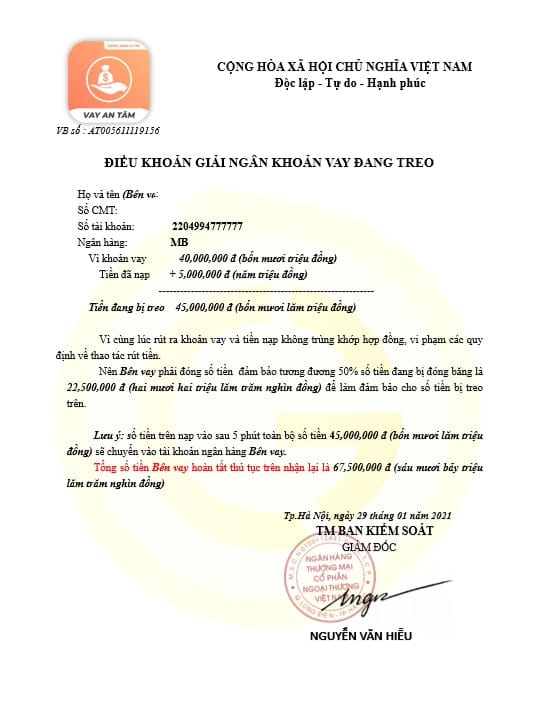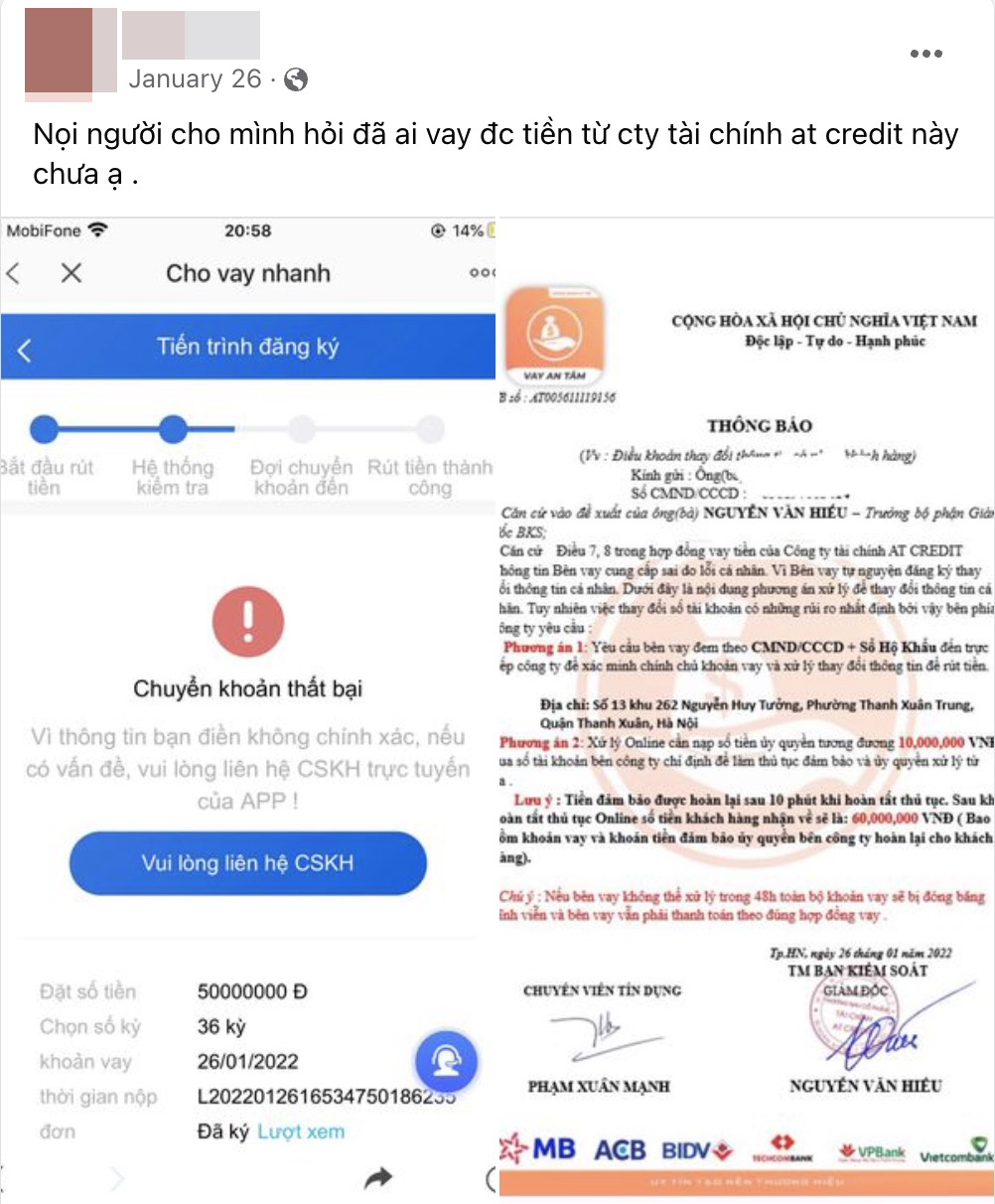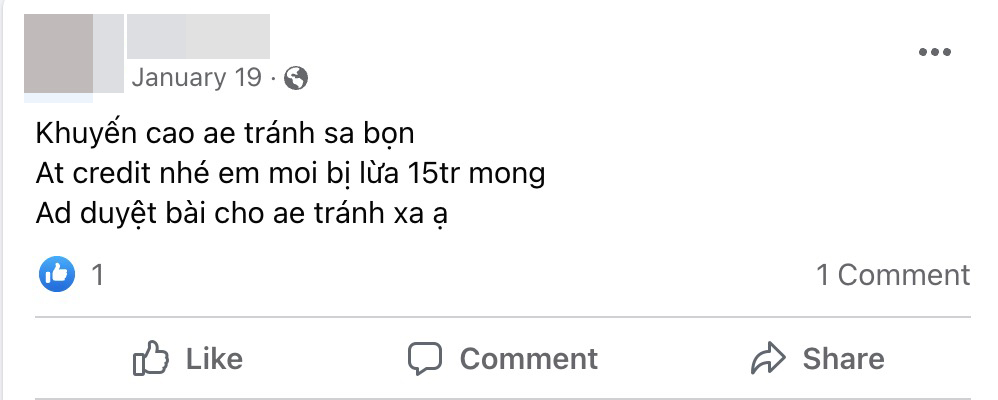Was scammed 75 million when borrowing through the application
Recently, Ms. Nguyen Thi H. (Song Khe, Bac Giang) fell into a situation of heavy debt when applying for a loan. She said that she was having financial problems and needed money urgently, so she sought “hot” loans through the application. Looking through Facebook, she found a financial company called “AT Credit” was supporting quick loan procedures, disbursed after 5 minutes, so she applied for a loan of VND 50 million with a term of 36 months.
Ms. H. was contacted by a person claiming to be an employee of the financial company AT Credit via Zalo. After receiving loan information, this subject sent Ms. H. a link to the website “hahachao.com” (this page cannot be accessed from the homepage, must be accessed via the link sent from the scammer’s Zalo), ask Ms. H. to enter the necessary information such as name, bank account number, citizen identification number and photograph.
Scammers guide to register loan information via website “hahachao.com”
After sending the information, Ms. H. asked about the disbursement process of the borrowed amount, but at this time, AT Credit said that because Ms. H. had entered the wrong bank account number, the company could not disburs . This is a trick of fraudulent loan application services, blaming the borrower for entering the wrong information even if it is correct.
In order to update the bank account number information, the above fraudster offers 2 options: bring his citizen ID directly to the company and receive cash disbursed on the spot, at the headquarters of AT financial company. Credit address at “Floor 4, No. 282 – 288 Tran Nao, Quarter 2, Binh An Ward, District 2, Ho Chi Minh City”; or carry out the procedure of “guaranteeing authorization” and proceed to transfer the amount of VND 5 million to a personal account to “verify the account”, then edit the borrower’s information.

The scammer requested to transfer money to a personal account in the name of the company’s finance department
Through our research, at the above address, there is absolutely no company named “AT Credit”. This is a virtual address created by this company, hitting the psychology of distant borrowers who cannot go directly to the company, thereby forcing them to switch to the second option.

The financial officer of the self-proclaimed “AT Credit” company, is actually a fraudster in a large-scale organization
After transferring the money, the scammer continued to ask Ms. H. to transfer a “guaranteed” amount of 10 million VND. According to this subject, the “authorization money” transferred to the account number of the company’s finance department will be refunded along with the previously registered loan amount, ie 60 million VND.
However, even after the transfer, the fraudster repeatedly reported a problem in the loan verification process and demanded that Ms. H. have to transfer more “authorized” money to be able to disburse. In most cases, borrowers are blamed for mishandling withdrawals. The total amount that Ms. H. has transferred to the scammers is 75 million VND, but up to now, it has not been disbursed.

Ms. H. said that the amount of 75 million dong that was appropriated was borrowed money from relatives and relatives. Until now, I still have no money, so I have to take on a big debt
Beware of sophisticated tricks of online scammers
There are many fraudulent tricks to appropriate borrowers’ assets online. These subjects often take advantage of the gullibility and lack of understanding of the borrowers, hitting the fear and needing money urgently, so they force the borrower to transfer a certain amount of money in advance.
This procedure is usually performed as follows.
1. Run ads on online / through-app loans without cumbersome procedures, quick disbursement.
2. When a borrower registers, a self-proclaimed employee of a bank or financial company will contact and send an access link to a fraudulent website, invested in an interface to increase credibility.
3. Ask the borrower to enter the necessary information, including the bank account number and the loan value, which can be up to billions of dong.
4. After entering the information, the fraudster said that the account number or some other information was wrong, asking the borrower to transfer money to correct the information.
5. Continue to ask and urge the borrower to advance a certain type of service money (fee, authorization, …) usually from 10% to 20% of the loan value. This amount will be paid with the disbursement. The receiving accounts are all personal accounts.
6. If the borrower makes a money transfer, the objects will block contact, the website cannot be accessed and so the transferred money is lost.
To build trust, fraudsters will forge documents and notices of financial companies with red marks, and at the same time indicate that the company itself cooperates with the authorities to assist travelers. loans during the COVID-19 pandemic. All of them are scams and just to appropriate the assets of gullible people.

Forged documents of a self-proclaimed financial company, requiring the borrower to pay a security deposit for entering incorrect information or “violating the rules on withdrawal”, otherwise the disbursed amount will be suspended.
Currently, on social networks, there have been many cases of being scammed by the financial company “AT Credit” to appropriate tens of millions of dong with similar tricks. Notably, scammers operate under many names such as “CG Credit”, “AT Credit”, “AT Finance”… The common point of these self-proclaimed “financial companies” is that they all have tricks. The loan process is very fast, just a few personal information, no mention of interest rates or very attractive interest rates.









Many people have been scammed by the self-proclaimed “AT Credit” financial company
Before the sophisticated tricks of online fraudsters, consumers need to be careful when applying for a loan, especially through the online form because this is one of the areas of organized fraud. The subjects left no trace and it was difficult to recover the lost money, even after reporting it to the authorities.
